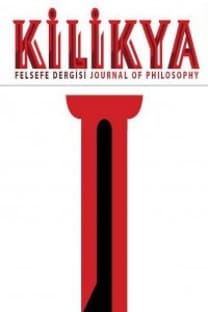Adorno’nun Bilgi Kuramı Eleştirisinde Husserl Fenomenolojisinin Yeri
Yalnızca özgürlüğün ön koşul olduğu eleştirel düşünmenin sağlam bir temele ihtiyacı vardır. Klasik modern felsefenin bu temeli artan bir ilgiyle bilimde bulacağına duyduğu inanç, bilgi kuramını felsefe için hayati değerde bir alan haline getirmiştir. Bu çerçevede bir yandan deneycilerin öte yandan akılcıların ortaya koydukları fikirler aynı temel soruya yanıt verme amacını taşısalar da çözümlerinin birbirleriyle uzlaşmaz oldukları iyi bilinir. Descartes’tan bu yana çok değişmeyen felsefenin Janus yüzlü bu halini kalıcı bir çözüme kavuşturmak isteyen filozoflardan birisi de Husserl olmuştur. Husserl’in fenonomenolojik yaklaşımının bilgi kuramının doğasına yönelik tespitleri Adorno’nun ilgisini çekmiştir. Husserl’in açık seçik sağlam bir temel arayışının fenomenolojik bir çözümlemeyle nasıl olumlu sonuçlandırılabileceği büyük bir sorundur. Bu yazıda Adorno’nun; mantığın kuşku götürmez oluşunu örnek alsak bile sonsuz bir döngüye kapılmadan Husserl’in felsefeye uygun bir temel kuramayacağını öne sürdüğünü göstereceğiz. Husserl’in fenomenolojik yaklaşımından kaynaklanan tutarlı bir bilgi kuramına, yine Husserl’in betimlediği “bunalım” nedeniyle olanak kalmamıştır. Artık bilgi kuramının içinde kalmanın felsefece bir değeri yoktur; bilgi kuramını modern felsefenin ana konusu haline getiren koşulların ele alınması öncelik taşımaktadır. Adorno bu önceliğin, Husserl felsefesinde gözetilmeyişinin, onun hem kaçınılmaz bir sonucu hem de zorunlu bir başlangıcı olduğunu düşünür.
The Place of Husserl’s Phenomenology in Adorno’s Critique of Epistemology
Only critical thinking, where freedom is a precondition, needs a solid foundation. The belief that classical modern philosophy will find this foundation in science with increasing interest has made the theory of knowledge a vital field for philosophy. In this context, although the ideas put forward by the empiricists and the rationalists aim at answering the same basic problem, it is well known that their solutions are incompatible with each other. Husserl was one of the philosophers who wanted to reach a permanent solution to this Janus-faced version of the philosophy that has not changed much since Descartes. The outcomes of Husserl's phenomenological approach towards the nature of epistemology draws Adorno’s interest. It would be a major challenge how Husserl's explicit search for a solid foundation can be positively concluded by a phenomenological analysis. Even if we take an example of the unquestionable reasoning of logic, in this article, we will argue that from Adorno’s perspective Husserl cannot establish a foundation suitable for philosophy without drawn into an infinite regress. A coherent theory of knowledge resulting from Husserl's phenomenological approach is no longer possible due to the “crisis” described by him. Remaining in the theory of knowledge has no philosophical value anymore, but reflecting on the conditions that make the theory of knowledge the main subject of modern philosophy bears a priority. Adorno thinks that this priority which is ignored in the philosophy of Husserl, is both an inevitable result and a necessary beginning for his phenomenology.
Keywords:
Knowledge, Reality, Truth, Experience,
___
- Adorno, T. W. (1940). “Husserl and the Problem of Idealism.” The Journal of Philosophy, 37(1), 5–18. https://doi.org/10.2307/2017136
- Adorno, T. W. (1999). Hegel Three Studies (S. W. Nicholsen, Çev.; 2nd MIT Press pbk. ed.). MIT Press.
- Adorno, T. W. (2013). Against Epistemology A Metacritique. (W. Domingo, Çev.; 1st ed.). Polity Press.
- Dallmayr, Fred R. (1981). Twilight of Subjectivity Contributions to A Post-Individualist Theory of Politics. University of Massachusetts Press.
- Foster, R. (2007). Adorno: The Recovery of Experience. Albany: SUNY Press.
- Husserl, E. (1931). Ideas A General Introduction To Pure Phenomenology (W. R. B. Gibson, Çev.). Allen and Unwin.
- Husserl E. (1997). “İçsel Zaman Bilinci.” (Doğan Şahiner, Çev.) Cogito, 11, 17-28.
- Nagel, T. (2012). Mortal Questions (Canto edition.). Cambridge University Press.
- O’Connor, B. (1994). “Adorno’s Dialectical Epistemology.” Idealistic Studies, 24 (1), 61–76. https://doi.org/10.5840/idstudies19942415
- Piccone, P. (1983). “Against Epistemology: A Metacritique.” Telos, (56), 229–235. https://doi.org/10.3817/0683056229
- Yayın Aralığı: Yılda 2 Sayı
- Başlangıç: 2014
- Yayıncı: Eray Yağanak
Sayıdaki Diğer Makaleler
Merleau-Ponty’nin Bedenlenme Fenomenolojisi Bilinç ve Beden Bütünlüğü
Üst Düzey Ontoloji İnşasındaki Felsefi Yaklaşımlar
Duyu Verisi Kuramı ve Algının Fenomenal Belirsizliği
Açık Sınırlar mı Kapalı Sınırlar mı: İşte Bütün Mesele Bu mu?
Adorno’nun Bilgi Kuramı Eleştirisinde Husserl Fenomenolojisinin Yeri
